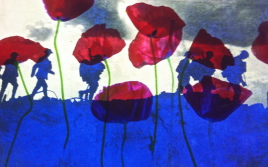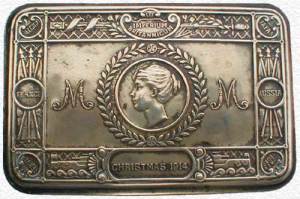Transcript
It is a hundred years since the start of the first world war, and this Christmas marks the 100th anniversary of the Christmas Truce – the soldiers’ truce – in that war.
Our special Christmas podcast is introduced by Stephen Sedley, former Appeal Court Judge and Visiting Professor in the Faculty of Law at Oxford University, who, nearly 50 years ago, recorded the interview with Frank Austin, which is at the heart of this podcast. Frank was a 21 year old soldier when he took part in the 1914 Christmas Truce.
Stephen Sedley: Frank Austin was a Fleet Street compositor in the days when newspapers were set in hot metal. He was born in 1893 and was still an apprentice when he signed up in 1914 without a second thought, after all, everyone knew the war would be over by Christmas….
In 1966, in his sitting room in Edgeware, Middlesex, I recorded some of Frank’s memories of a conflict that, by pure good fortune, he survived – one of fewer than 30 known survivors of an entire regiment. But on the first Christmas day of the war, Frank had both witnessed and taken part in one of the most significant and dramatic events in the history of warfare. As he reflects in this recording, in that brief moment of time, the troops could have stopped the war.
This is the account he gave me half a century later.
Frank Austin: A day or two before Christmas, we were given Princess Mary’s Golden Gift Box. It was flat, gilt, and there were cigarettes on one side and pipe tobacco on the other and also a photo of Princess Mary, as she then was.
On Christmas day, dawn broke. And not a shot was fired.
A little further down to the right we saw a white flag flying. And several Germans came out, very slowly, and one officer was waving a white handkerchief. We could see that there was a sort of ……..armistice?
They were very friendly. We gave them some of our rum, or rather our sergeant did, and we had some of their schnapps. I can’t remember what they gave us to eat. I handed out one or two tins of Maconochie’s M&V [Meat and Veg] ration. I don’t know what they thought of the bully beef others gave them!
I remember sitting on a log – there were two Germans and my own sergeant as well – and they showed me their photographs of their wives and children. One of them could speak English very well – he’d been a student and had had a job in the West End for some time. He seemed to be politically conscious, because he asked the sergeant, I remember this very well, if he knew why we were fighting. And of course we had no more idea than that we thought it was the right thing to be doing.
This business went on all day, and a good many of us got rather drunk and they were actually in our trenches, and some of our lads (I didn’t go myself) went up to their dug outs – I don’t know what they got up to!
There was football, I don’t know whether it was a real football, or simply a lot of newspapers tied up with string (some said one thing and some the other), I didn’t actually see it. There was a game, on a flat piece of ground between the trenches, with two piles of grey uniforms and two piles of khaki uniforms – and some sort of a ragtime game was arrived at.
It seems incredible looking back on it.
It must have worried the General Staff a whole lot. Because when the dawn broke the following day, the Germans didn’t come out of their line at first on Boxing Day morning, but to our surprise we heard the rattle of machine guns further off to our right. I have heard that the Staff sent up a battalion of the Guards to open fire, and of course once the machine guns started up the battle was on once more. As far as I was concerned that was the end of the Christmas celebrations. Two nights later I was almost the last to leave the trenches, and we’d had no casualties worth talking about.
I have often thought……all that slaughter that followed…… and yet the soldiers had the will to bring the war to an end,
The slaughter Frank talks about in the longer interview, includes this about a game of cards……..
Main picture: Josie Taylor
There is more documentation – words, sounds and pictures – of World War I in the Imperial War Museum archive.



Subscribe with…